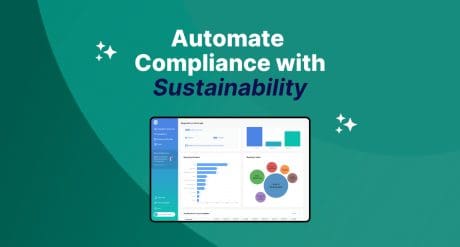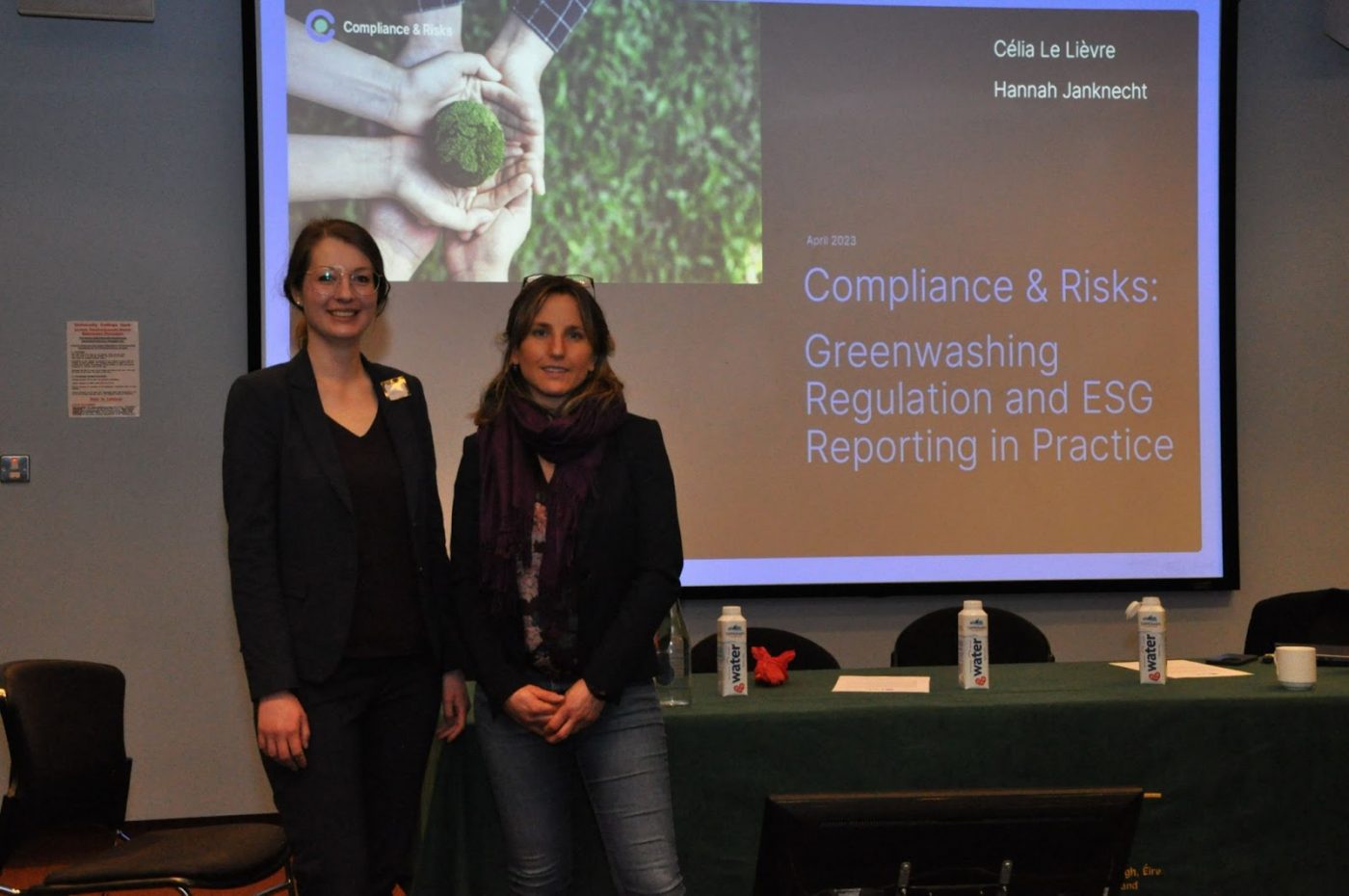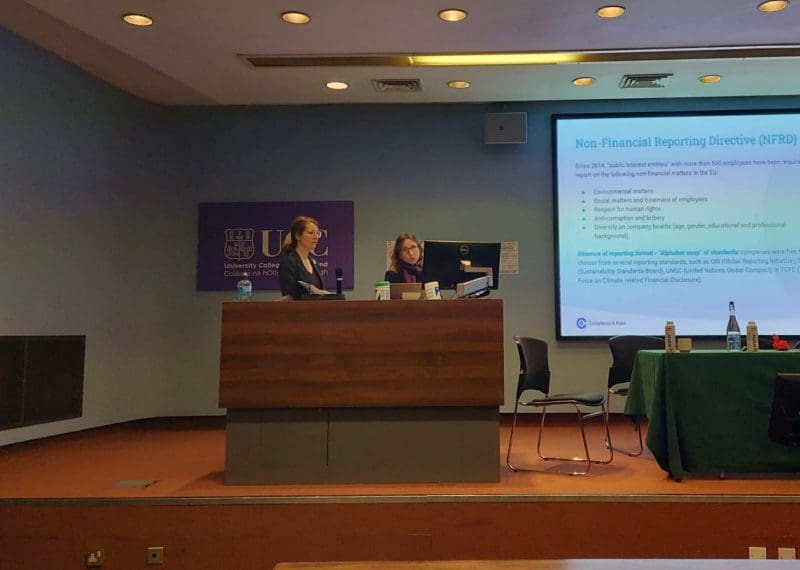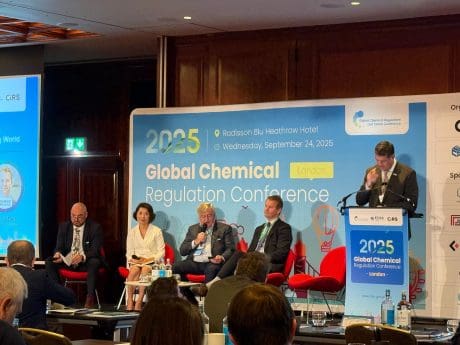
Key Takeaways From The UCC Law and Environment Conference

Authored by Celia Le Lievre, Senior regulatory compliance specialist and Hannah Janknecht, regulatory analyst, compliance & risks
The 19th Law and the Environment Conference took place on 20 April 2023 at University College Cork (UCC) in Ireland. The annual conference, organized mainly by the UCC School of Law, provides a forum for the discussion of a vast array of topics in the field of environmental law, regulation and policy and enables an exchange between researchers, practitioners and civil society organizations.
Environmental Law As Administrative Governance
The topic of this year’s conference was ‘Environmental Law as Administrative Governance’. A panel of experts presented the latest regulatory developments in key environmental areas including ESG reporting, greenwashing, plastic pollution, rights of nature and climate adaptation and mitigation.
CSRD And Its Impact On Greenwashing
As part of the panel on ‘Transnational Environmental Governance: Regulation of “Greenwashing”’, Celia Le Lievre and Hannah Janknecht from the Global Regulatory Compliance team at Compliance and Risks had the opportunity to present on the European Corporate Sustainability Reporting Directive (CSRD) and its impact on greenwashing.
The presentation outlined the limits and opportunities of the CSRD to effectively address greenwashing risks in the coming years.
It focused on the upcoming European sustainability reporting standard for Climate Change (E1) and the newly established requirements for external auditing and assurance.

Key Takeaways
Whilst selecting from the many interesting impressions is not easy, we want to share three of the conference’s key takeaways:
Relevance of an interdisciplinary approach:
The composition of the conference shows how important an interdisciplinary approach is for an effective and powerful regulation of the many environmental crises we are facing today. While many discussions were led by lawyers and academics in the legal field, significant contributions were also made in the field of marine biology, microbiology, economics, chemistry and many more.
This included a talk on the concept of circularity presented by the Director of the School of Chemistry in Trinity College Dublin, Prof. Michael Morris, and an analysis of the impact on environmental compliance on company performance presented by Ms Maria Cespedes-Davalos from the UCC Business School.
The interdisciplinarity of the conference did not only provide us with a fresh angle but also helped to understand the importance of the translation of scientific findings into binding rules.
Increasing importance of the regulation of greenwashing from all angles:
The panel on ‘Transnational Environmental Governance: Regulation of “Greenwashing”’ gave a great overview of the emerging regulation of greenwashing from different angles, ranging from ESG reporting to the protection of consumers from false green claims to green claims in the financial sector.
C&R started the panel with a discussion of the implications of the new Corporate Sustainability Reporting Directive. A second presentation gave interesting insights into the misleading use of terms such as ‘compostable’ and ‘biodegradable’ and the confusion among consumers resulting from the use of these terms.
The presentation was based on experiments with tea bags that claimed to be biodegradable and a following exchange with the Irish Competition and Consumer Protection Commissioner over a potential infringement of consumer protection law. The third presentation looked at green claims in the financial sector, comparing the vast amount of green financial products that became available in recent years with the likelihood of all of them meeting their promises.
The quantity and pace of regulatory developments:
One of the hot topics discussed at the conference is the significant increase in the number of environmental regulations that have been enacted globally over the past couple of years and the difficulties that this can pose for businesses and practitioners alike. This ‘regulatory avalanche’ is particularly evident in the area of ESG. For example, C&R C2P’s regulatory database had 28 ‘in force’ global ESG reporting regulations at the beginning of 2022 and ended with 101 at the end of the year which represents an 82% increase.
Staying On Top Of Ever-Changing Regulations
While many of the topics presented at the Conference such as climate change litigation and plastic pollution have already been included in earlier conferences, the speed of developments was highlighted as a particular challenge. Dr Noreen O’Meara from the University of Surrey pointed out in her presentation on the Global Plastics Treaty that just a few years ago, she gave a presentation at the UCC conference on plastic pollution without a global treaty being anywhere in sight.
At this year’s conference however her focus shifted to the key points of the UNEA Resolution for a global plastics treaty for ocean and marine protection.
This highlights the importance of keeping up to date with regulatory developments and trends not only at the national, but also the international and transnational level. Tools such as C&R’s C2P platform are vital to ensure that companies are aware of what regulations they need to comply with and what is coming down the line.
See Our ESG Solution In Action
Accelerate your ESG Compliance with our ESG Solution, a smarter way for organizations to meet mandatory ESG obligations.
Register for our bite-sized product demo








